Are you tired of feeling unwell without clear answers? Have you tried traditional medical tests, only to be told it’s all normal? You’re not alone. Many people are turning to functional testing to uncover the root causes of their health issues when conventional testing fails to find them answers.
Functional testing looks for answers using markers that reflect the functionality of physiological systems like hormones, digestive organs, and nutritional status. Instead of aiming to diagnose symptoms, it aims to diagnose dysfunction. As such, it is a method that looks beyond conventional labs in order to capture data that reflects the health of whole bodily systems. By assessing these systems, it provides a more comprehensive picture, and deeper look into what could be going wrong.
Who can order functional tests?
Functional tests are typically ordered by healthcare practitioners with a background in functional medicine such as functional nutritionists, functional health coaches, naturopathic doctors, functional medicine doctors, or integrative physicians. These practitioners have advanced training and are able to assess your medical history, labs, symptoms, and health goals in order to determine the most appropriate functional tests.
How are functional tests performed?
Functional tests can involve a number of different types of samples and collection methods. Once ordered, patients will receive a test kit and will be instructed on the sample collection process. This typically involves providing saliva, blood, stool, or urine samples according to specific instructions. More often than not it is a sample that can be collected in the privacy of the patient’s home but some do require a blood draw from a phlebotomist.
What is the cost of functional tests?
Payment for functional tests can vary based on the provider, whether that provider orders directly from the lab or from a third party, and whether they upcharge or not. In rare cases, labs may allow insurance billing where as some of the cost is covered, while most require upfront payment in full. Unfortunately, there will always be some amount of out-of-pocket expenses, but HSA and FSA cards are always accepted and the cost can often be reimbursed if out of network deductibles are met.
At Gut Brain Body, I offer my functional tests at base pricing and with no up-charge, so you know you are getting the most affordable price possible for each test.
Let’s explore the benefits of several key functional tests:
Comprehensive Bloodwork
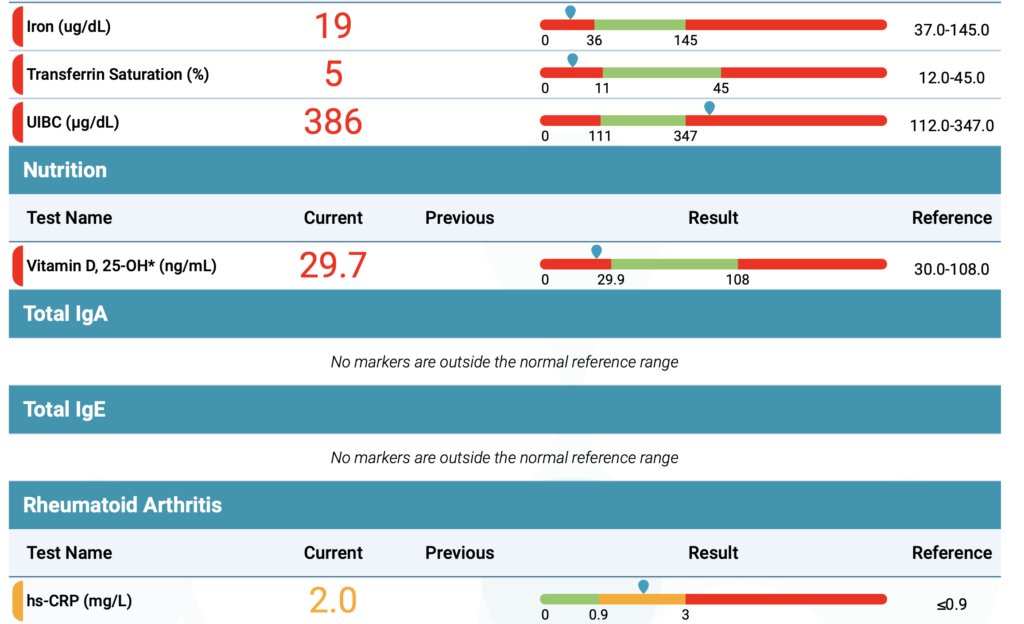
Comprehensive blood work is technically not a functional test, but it can be ordered in a way that provides a lot of insight into system function. I find it essential for gaining insights into overall health and detecting potential imbalances. I include it here because I always start out with this test in order to gain an upfront look at my client’s health in a comprehensive way. Thus it’s important for you to know about.
My bloodwork panels cover a wide range including liver/ kidney function, sex/thyroid, and stress hormone levels, multiple inflammation markers, vitamins and minerals, blood sugar and insulin regulation, as well as immune function markers. This often provides me with important insights like deficiencies that need to be addressed, the severity of inflammation which can warrant a more gentle approach, or signs of infection and metabolic dysfunction which would warrant a deeper dive.
What’s the cost? My bloodwork does incur an out pocket expense but the rates are discounted heavily and offer a massive amount of data for relatively low cost. On average I see it costing anywhere from $200-$450 before phlebotomy fees. In addition, I often times can use recent bloodwork ordered from other providers to cut back on the costs and make it more affordable. In the end, I can always modify the panel to meet the needs of my patient and have it make sense for their financial situation and health goals.
Comprehensive blood tests can help identify and monitor chronic conditions, assess the effectiveness of my interventions, and prevent harm by understanding the condition of the patient’s body before recommending more aggressive protocols like detoxification, fasting, HIIT, etc.
Food Sensitivity Testing

Food sensitivities are the most common functional test that I order. I have seen it work miracles in many patient’s over the years so I am 100% in the camp of food sensitivies are real and very much impacting our health.
Food sensitivities occur when the immune system reacts negatively to certain foods as they are consumed. This process is enabled by poor digestion, poor recognition (like when foods are GMO or covered in chemicals), immune system dysfunction in general, and a leaky gut. I see this often in those with nutrient deficiencies that affect the immune system, a chronic intake of toxins and liver stress, chronic infections (especially gut infections), as well as thyroid issues. Either way, over time, these sensitiveness build and produce a more delayed response – relative to food allergies. Patients may notice digestive issues, skin problems, fatigue after eating, and brain fog – to name a few. Albeit, despite their impact on health and quality of life in general, they are often misdiagnosed.
Food sensitiveness and food allergies are very different, are measured differently in the blood, and are often not orders by allergists. While traditional allergy tests may use skin prick or blood testing for IgE antibodies, food sensitive are assessed by measuring IgG antibodies. Ideally, this is performed using ELISA testing, which is considered the gold standard for detecting food sensitivities – so always check to make sure your test is using this method! I prefer to use Diagnostic Solutions IgG Food Explorer for this which usually costs around $180 for my patients and is performed as a skin prick in the convenience of your own home.
Compared to IgE antibodies, IgG antibodies last much longer in the body – upwards of 3 months in some cases. They are the same antibody used to enable long term immunity against all kinds of infections, however, they may also cause inflammatory symptoms if elevated chronically and in high amounts. It’s important to note that IgG antibodies do not always induce symptoms as it depends on the milieu of other inflammatory issues happening in the body. Either way, by identifying these sensitivities, individuals can manage experiment with dietary modifications and see if it results in noticeable improvements to their overall well-being.
SIBO Breath Testing
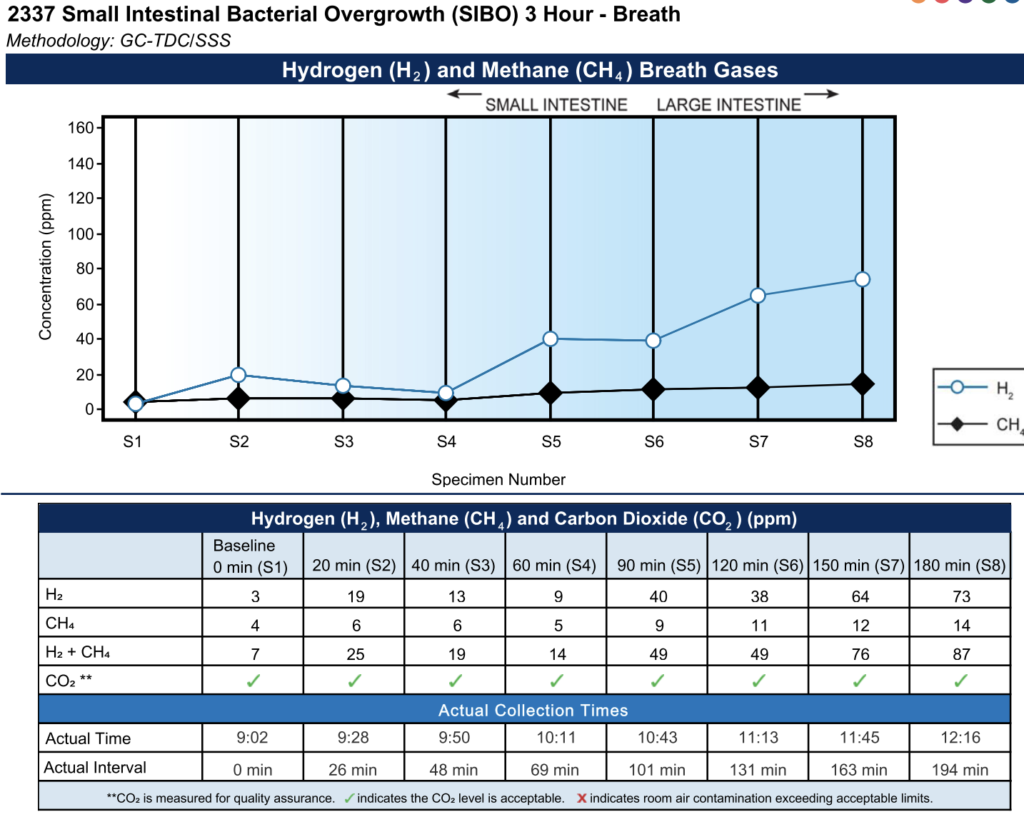
SIBO, or Small Intestinal Bacterial Overgrowth, is a condition where excessive bacteria accumulate in the small intestine. This can lead to a range of digestive symptoms, including bloating, gas, abdominal pain, diarrhea, and constipation. It is surprisingly common and is one of the first things I like to rule for my patients with chronic digestive symptoms.
SIBO testing works by taking prebiotic fluids and measuring the type and amount of gases produced, which gives you info on the microbial fermentation throughout the intestines. By identifying excessive activity and the type of gasses in the small intestine, I can develop targeted treatment plans that address the underlying infection. Unlike traditional stool tests, which primarily examine bacteria in the large intestine, SIBO tests specifically target the small intestine. Thus it’s important to remember that comprehensive stool tests cannot diagnose SIBO.
SIBO testing is crucial in my practice. With it I can help my clients resolve debilitating symptoms, and help them return to digestive normalcy. In addition, I can address nutritional health from a function level. The small intestine is primarily designed for nutrient absorption, thus any inflammation or infection in this area can interfere with nutrient uptake. Many conventional doctors often overlook SIBO as a possible cause of many digestive symptoms, thus I’m proud to offer it in my functional nutrition clinic.
I use the Genova 3 hr SIBO test which provides lactulose and covers 3 hrs of fermentation. This is the best test on the market. It costs about $230, and is performed in the convenience of your own home.
Comprehensive Stool Analysis
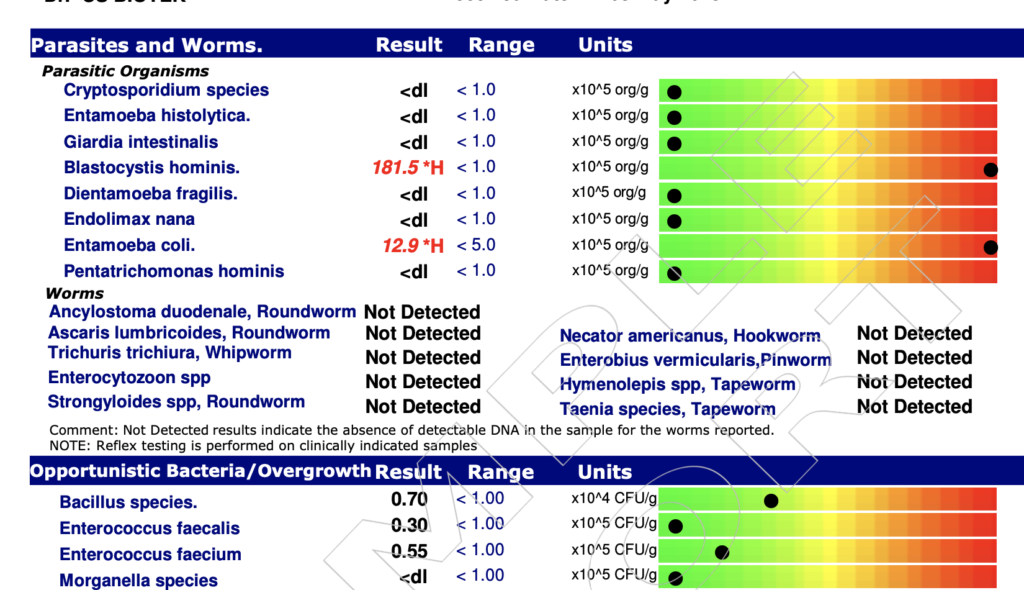
Comprehensive stool testing provides valuable insights into gut function by analyzing various components like the presence of pathogens, poor digestion, deficiency of short chain fatty acids, and the presence of inflammation. I use the US Biotek Advanced GI Panel as my stool test of choice, which costs about $400 and is a stool collection performed at home.
On a microbial level, this test looks for the presence of pathogenic and healthy bacteria, as well as parasites, yeast, and gut viruses. To accurately identify and quantify these microorganisms, quantitative PCR (qPCR) testing is used, which is considered the gold standard. qPCR offers superior sensitivity and specificity compared to traditional culture methods, allowing for the detection of even low levels of pathogens or imbalances in the gut microbiome. By combining qPCR with culture, this test offers a comprehensive picture of the gut ecosystem, enabling targeted interventions to restore optimal digestive function.
Comprehensive Hormone Testing
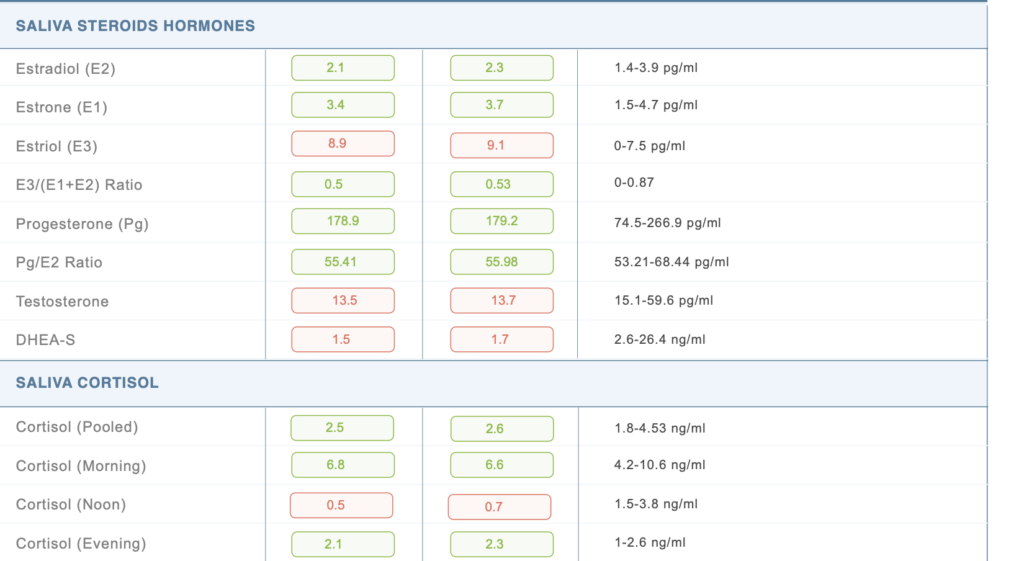
Sex hormone and cortisol testing is essential for understanding and addressing hormonal imbalances that can significantly impact overall well-being. These hormones play critical roles in mood, energy levels, libido, fertility, and stress response.
Salivary testing is often preferred for measuring sex hormones (estrogen, progesterone, testosterone) and cortisol due to its accuracy in reflecting biologically active hormone levels. By assessing hormone fluctuations throughout the day, I can gain valuable insights into your hormone patterns, identify imbalances, and develop personalized treatment plans to optimize hormonal health.
I also use urine hormone tests when necessary, usually for those patients on hormone replacement or when a more comprehensive look at hormones and their metabolites makes more sense.
I use the Vibrant Wellness saliva hormone test which costs about $200 and is performed at home. For Urine hormone testing I also use Vibrant Wellness which costs about $400.
Mold Toxin Testing
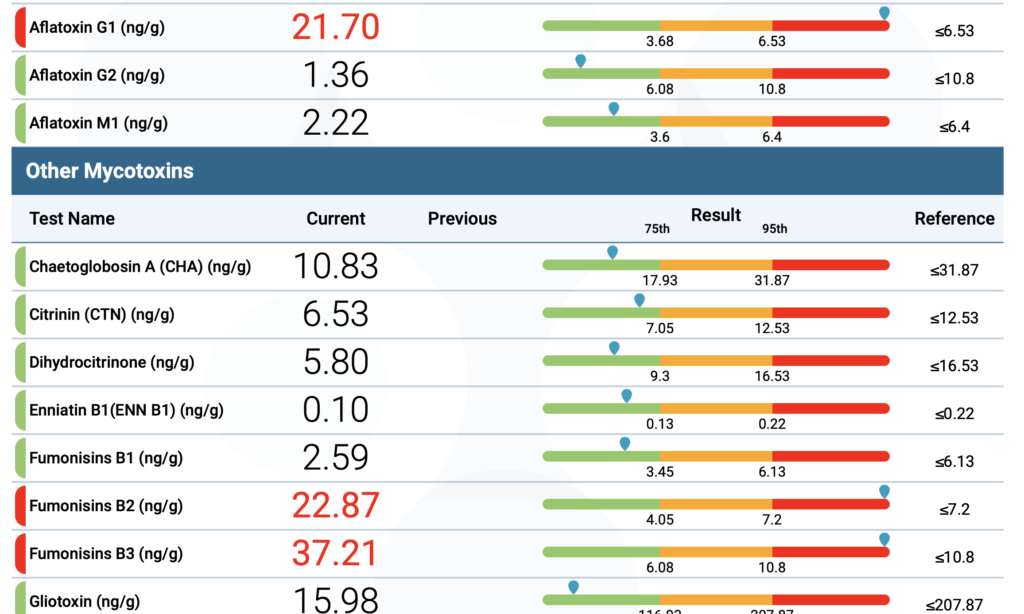
Mold toxin exposure is a significant health concern due to the widespread presence of mold in our environment and the potential for severe health consequences. Risk factors for mold exposure include living in humid climates, residing in older homes with water damage, and occupational exposure to mold-contaminated environments. Prolonged or severe mold exposure can lead to a range of symptoms, including respiratory issues, neurological problems, fatigue, and immune system dysfunction. Identifying and addressing mold toxin exposure is crucial for preventing and managing these health challenges.
I use the Vibrant Wellness test which uses mass spectrometry (the gold standard for particle testing). It costs about $380 and is a urine test performed at home.
Organic Acids Testing

Organic acids testing or OAT testing is used to identify a number of underlying issues. Primarily I use it to identify yeast issues, oxalate toxicity, oxidative stress, and functional nutrient deficiencies. These can be relevant to a lot of conditions from digestive issues, chronic inflammation, pain, weight gain, and others.
The OAT test looks for a myriad of metabolites in the urine that can be produced by a number of different biochemical pathways. These pathways are too numerous and complicated to describe here.
I use the Vibrant Wellness OAT test which costs about $270 and is a urine test performed at home.
Heavy Metal Testing
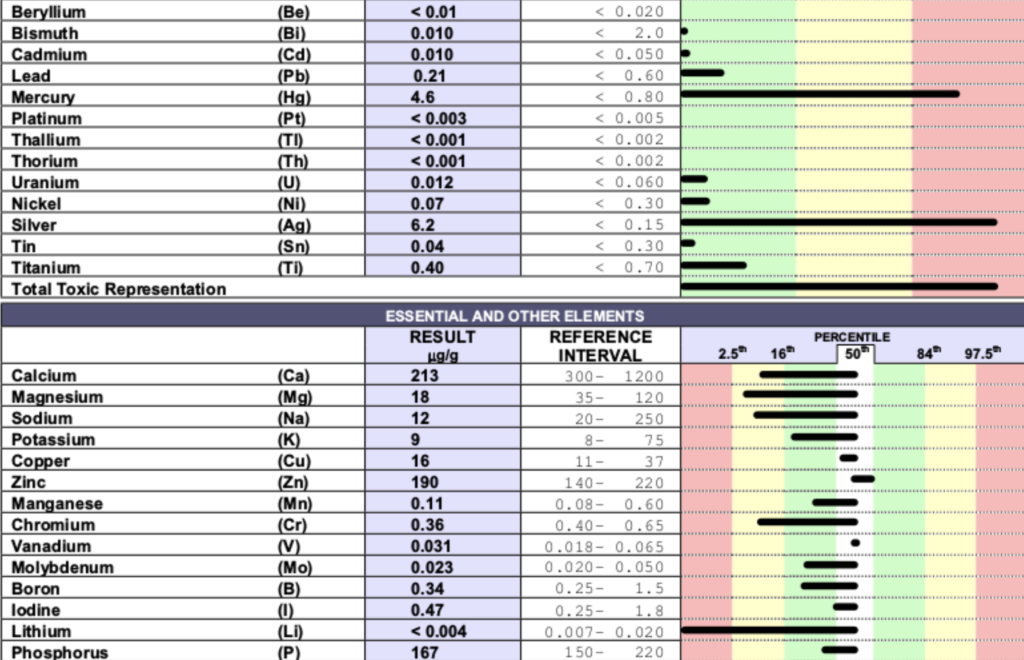
Heavy metal testing is crucial for identifying potential exposure to toxic substances that can accumulate in the body and contribute to various health issues. These metals, such as lead, mercury, cadmium, and arsenic, can originate from environmental pollution, industrial exposure, certain foods, and consumer products. Assessing heavy metal levels through methods like blood, urine, hair, or tissue analysis can help determine exposure and guide interventions to reduce toxicity. While blood and urine tests provide snapshots of current exposure, hair and tissue analysis can offer a longer-term perspective. The choice of testing method depends on factors such as the specific metal being evaluated and the suspected route of exposure.
I generally use the Doctors Data hair test which costs about $70 and is a hair sample collected at home.
Genetics Testing


Integrating genetic testing through platforms like Pure Insights, which analyze 23andMe or Ancestry.com data, further refines my holistic approach. By understanding genetic predispositions, I can tailor dietary and nutritional recommendations to optimize nutrient absorption, support metabolic pathways, and proactively address potential health risks, moving beyond generalized advice for truly individualized care.
For example, knowing a client’s variations in methylation pathways allows me to optimize their intake of essential B vitamins, supporting detoxification, neurotransmitter production, and overall cellular health. This level of personalization empowers my clients to make informed dietary choices that are truly aligned with their unique needs, maximizing their potential for optimal health.
Overall, functional testing offers a powerful approach!
I rely on them to uncover root causes of my patient’s health issues, and find that I would not be able to get the amazing results that I do without them. I understand they can pricey, but I rarely see a patient complaining about the price once they realize how helpful they can be. After all you can’t put a price on having the right answers.
By providing a comprehensive view of your body’s inner workings, these tests can help me make informed decisions about your health needs. However, it is not recommended to order these on your own. Functional testing is best utilized in conjunction with a qualified healthcare practitioner like myself who can interpret the results with respect to your full health picture and develop a safe personalized plan. None the less, taking a proactive approach to your health through functional testing can lead to significant improvements in energy, digestion, mood, and overall quality of life.
Please let reach out if you have more questions or would like to learn more about getting some tests ordered for you!
Disclaimer: This information is for educational purposes only and does not constitute medical advice. Always consult with a qualified healthcare professional for diagnosis and treatment.






